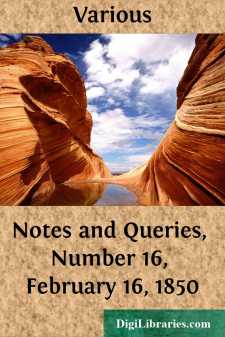Categories
- Antiques & Collectibles 13
- Architecture 36
- Art 48
- Bibles 22
- Biography & Autobiography 813
- Body, Mind & Spirit 142
- Business & Economics 28
- Children's Books 15
- Children's Fiction 12
- Computers 4
- Cooking 94
- Crafts & Hobbies 4
- Drama 346
- Education 46
- Family & Relationships 57
- Fiction 11828
- Games 19
- Gardening 17
- Health & Fitness 34
- History 1377
- House & Home 1
- Humor 147
- Juvenile Fiction 1873
- Juvenile Nonfiction 202
- Language Arts & Disciplines 88
- Law 16
- Literary Collections 686
- Literary Criticism 179
- Mathematics 13
- Medical 41
- Music 40
- Nature 179
- Non-Classifiable 1768
- Performing Arts 7
- Periodicals 1453
- Philosophy 64
- Photography 2
- Poetry 896
- Political Science 203
- Psychology 42
- Reference 154
- Religion 513
- Science 126
- Self-Help 84
- Social Science 81
- Sports & Recreation 34
- Study Aids 3
- Technology & Engineering 59
- Transportation 23
- Travel 463
- True Crime 29
Notes and Queries, Number 16, February 16, 1850
by: Various
Categories:
Description:
Excerpt
NOTES.
DANIEL DE FOE AND HIS GHOST STORIES.
I feel obliged by your intelligent correspondent "D.S." having ascertained that De Foe was the author of the Tour through Great Britain. Perhaps he may also be enabled to throw some light on a subject of much curiosity connected with De Foe, that appears to me well worth the inquiry.
Mrs. Bray, in her General Preface prefixed to the first volume of the reprint, in series, of her Novels and Romances, when giving an account of the circumstances on which she founded her very graphic and interesting romance of Trelawny of Trelawne, says—
"In Gilbert's History of Cornwall, I saw a brief but striking account, written by a Doctor Ruddell, a clergyman of Launceston, respecting a ghost which (in the year 1665) he has seen and laid to rest, that in the first instance had haunted a poor lad, the son of a Mr. Bligh, in his way to school, in a place called the 'Higher Broom Field.' This grave relation showed, I thought, the credulity of the times in which the author of it lived; and so I determined to have doctor, boy, and ghost in my story. But whereas, in the worthy divine's account of the transaction, the ghost appears to come on earth for no purpose whatever (unless it be to frighten the poor boy), I resolved to give the spirit something to do in such post-mortem visitations, and that the object of them should be of import to the tale. Accordingly I made boy, doctor, and the woman (who is said after her death to have appeared to the lad) into characters, invented a story for them, and gave them adventures."
Mrs. Bray adds—
"Soon after the publication of Trelawny, my much esteemed friend, the Rev. F.V.T. Arundell, informed me, that, whilst engaged in his antiquarian researches in Cornwall, he found among some old and original papers the manuscript account, in Dr. Ruddell's own hand-writing, of his encounter with the ghost in question. This he lent Gilbert, who inserted it in his History of Cornwall; and there I first saw it, as stated above. A few months ago, I purchased some of the reprinted volumes of the Works of Daniel De Foe. Among these was the Life of Mr. Duncan Campbell, a fortune-teller. To my great surprise, I found inserted in the Appendix (after verses to Mr. Duncan Campbell), without either name of the author, reference, or introduction, under the heading, 'A remarkable Passage of an Apparition, 1665,' no other than Dr. Ruddell's account of meeting the ghost which had haunted the boy, so much the same as that I had read in Gilbert, that it scarcely seemed to differ from it in a word. The name of Mr. Bligh, the father of the boy, was, however, omitted; and Dr. Ruddell could only be known as the author of the account by the lad's father calling the narrator Mr. Ruddell, in their discourse about the youth. The account is so strangely inserted in the Appendix to the volume, without comment or reference, that, had I not previously known the circumstances above names by Mr. Arundell, I should have fancied it a fiction of De Foe himself, like the story of the ghost of Mrs....












